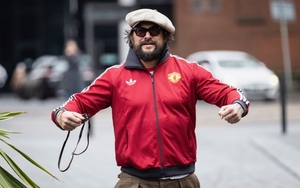SOMETIMES the logic fails me.
This is not a crisis. There’s some extremely difficult planned works that we always knew were going to be difficult...
We’re talking about the pavement extensions on Deansgate at Liverpool Road and Quay Street that narrow Deansgate to one lane coming from the south. These cause drivers to swerve in front of other drivers and cyclists. It’s a semi-permanent bedlam of grotesque mismanagement. “It’s dangerous there and we know it’s dangerous,” says Councillor Kate Chappell, the City Council executive member for the environment, a remit which includes transport.
“If you admit they’re dangerous then it's all easy. Get rid of them. Simple,” I say leaning forward and thinking we’re getting somewhere.
“No we’re not going to do that. We’re looking at lots of different solutions but each one we look at creates its own problems," says Councillor Chappell, calmly. She’s good at calm, this councillor, maintaining a Zen-like demeanour throughout the interview. She needs this air of tranquillity, later in the interview she admits she’s had to deal with a lot of anger.
We all have.
Everybody is angry when stuck in traffic. It's curious to watch the free Metroshuttle buses largely empty in queues of traffic because what is the point in sitting still when you can walk the same distance in twenty minutes and beat the Metroshuttle by as much again. Maybe the council and TfGM (Transport for Greater Manchester) have a sneaky plan to improve our health by making us walk. If so, our health might be improving but not our stress levels.
Below is a scene I witnessed on Portland Street recently. Frustration had caused one driver to jump lights and then swerve left in front of another. Anger was bubbling and a crash had resulted - although fortunately without injury.
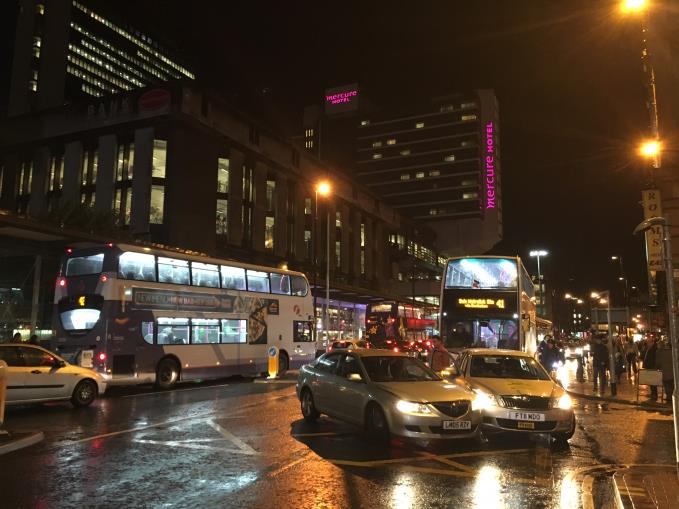 Things that go bump in the night
Things that go bump in the night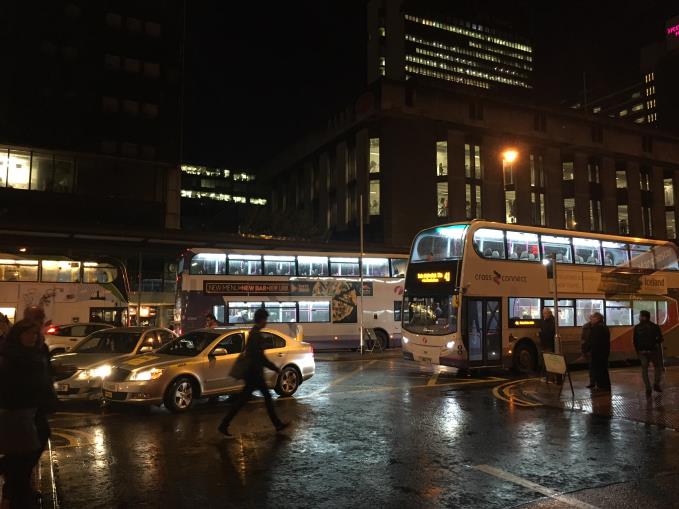 It's a city go slow
It's a city go slow“I’m confused,” I say getting back to the original point. “The traffic on Deansgate is terrible right now. These pavement extensions are not discouraging congestion, they are creating it by narrowing the road. Admit you got it wrong and get rid of the silly things. It's straightforward.”
“I agree what’s down there on the ground at the moment isn’t the right solution. The people who put in the Deansgate works got it wrong and we’re looking for a better solution but we’re not looking to move the pavement extensions because we don't think Deansgate can cope with the extra capacity,” continues Councillor Chappell.
"So you're not going to move the pavement extensions that create the congestion because if they weren't there they'd create more congestion? How does that work? The problem is created by these artificial constraints upon capacity and the Victoria Street closure further along. Deansgate could easily cope if you hadn't done these works. Don't you see?" I say, as flustered as a motorist on Bridge Street at 5.30pm, or a passenger on a Witch Way express bus at 6pm.
Earlier that day, Jas, a mini-cab driver, told me a story as we were held in a jam on Chester Road.
“Last Saturday,” he said. “I got a job about 5pm to pick up a young woman on City Road and take her to the Printworks – about a mile or so I suppose - where she was meeting her brother. It took me an hour and twenty minutes and I earned £8.
“We were stuck on Deansgate for ages so I tried a different route but that was as bad. I suggested she’d get there quicker walking but her brother was paying for the taxi and she had no money." He paused and added, "I was thinking of asking her to marry me by the end of the journey, after all by that time we knew everything about each other.”
It was a good joke that outlines the problem.
It’s not that the city has congestion it’s that the congestion, especially at pressure times, has become the rule not the exception. It hasn't helped that the city centre over the past few years has been redesigned to deliberately close off escape routes even for those who know it intimately.
But worst of all, as with Deansgate, the congestion seems to have been artificially created.
“A few years back,” I say to Councillor Chappell, “before all the road narrowings and road closures, the extra works and bus lanes, getting round was fairly easy except before certain evening football matches. I remember journalists coming up to Manchester from London and exclaiming at how light the traffic was. You and TfGM seem to have made a London of Manchester’s traffic. We’re going backwards. It's more dangerous especially for a group you champion, cyclists, and more delayed for another group you champion, bus travellers. Have you created a crisis where none existed?"
“This is not a crisis,” says Councillor Chappell who on her Twitter profile describes herself as 'Cyclist, greenie etc.', “There’s some extremely difficult planned works that we always knew were going to be difficult to manage. And then there are some unforeseen circumstances, the hole in the Mancunian Way in particular, which has added to the problems with the works. We knew it was going to be a difficult time but we're looking forward to 2017 and these issues being resolved.”
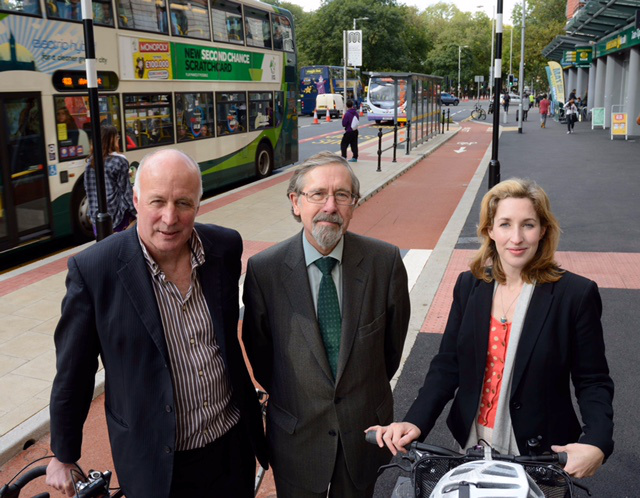 Councillor Kate Chappell on the right on the bike. The man in the centre is Councillor Andrew Fender, chair of Transport for Greater Manchester
Councillor Kate Chappell on the right on the bike. The man in the centre is Councillor Andrew Fender, chair of Transport for Greater Manchester“But we know there’s something amiss, if one incident such as the Mancunian Way sinkhole has such ramifications. That tells us the infrastructure is too fragile,” I say.
“The timing was unfortunate. Aside from the Mancunian Way remember we’ve had lots of events in the city centre, the Tory Party Conference was very difficult. Also we had to take the decision to start 2CC (Metrolink’s Second City Crossing) and the Portland Street works together,” says Councillor Chappell.
I ask Councillor Chappell if she regrets working on these two major projects at the same time.
“No. There’s a massive imperative to get both pieces of work done because they’re going to be fantastic in transforming the city. Get them over and done with, short, sharp, shock, so the city can open up and many many more people can get in on public transport. This is not anti-car. We’re not wanting to cut the numbers who wish to drive, but we have to accommodate an expected 20% increase in the population of Manchester, and we want to help those make the choice to travel on public transport.”
The council make much of these growth stats in justifying the present transport misery.
Sir Richard Leese writing recently, said, “The city centre is set to attract 40,000 new jobs and there will be a £5.5bn increase in our contribution to the national economy. The number of visitors coming here is growing all the time, we have the fastest growing need for quality office space outside London, and 100,000 people are now arriving in the city from across the world to study here. All over Manchester, exciting developments are being planned and it’s essential our transport infrastructure is reinvented so it’s suitable for a city on the move. Between now and 2017, our city centre will see more than £1bn invested in new projects to ‘future proof’ our transport infrastructure.”
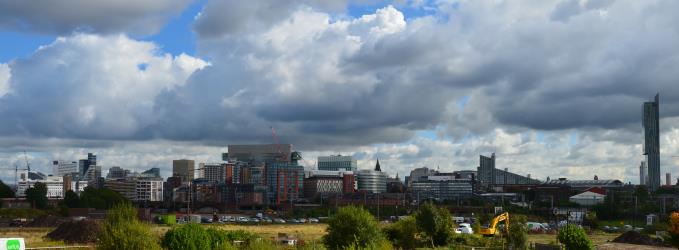 A city making itself ready for the future?
A city making itself ready for the future?Problem is there is no evidence the changes will bring the promised infrastructure paradise. We have to just take the council’s word for it.
Initiatives such as the total failure of the Rusholme changes several years ago which while attempting to ease the situation and make life easier for cyclists and other road users don’t fill observers with confidence. Nor do the bus lanes and the inconvenience they cause across the city. The one at the junction of Wilmslow Road and Platt Lane is a masterpiece of confusion.
Chappell says of Rusholme, “It was deemed a failure and we’re currently digging it up. Cycle ways will now be protected by kerbs. Changes were done for the best of intentions and didn’t work. Even the new system is a risk as it might not work either, maybe there are simply too many people using the road.”
“Name a successful example of a major road initiative?” I ask.
“Each road scheme has a different rationale behind it, we’re improving capacity for people to get in and out of the city such as along Upper Brook Street although that doesn't really work for cyclists," says Chappell and then rather less confidently. “There are loads of schemes although none I can think of.”
Ok. Right.
Not that, to be fair, the Council and TfGM aren't reacting to the traffic problems the city is currently experiencing, albeit problems they themselves have created.
Chair of the TfGM Committee, Cllr Andrew Fender, said: “The delivery of two major transport schemes through the city centre was always going to be extremely challenging – and that is exactly why the works have been carefully planned, programmed and co-ordinated in conjunction with the city council and key partners.
“Additional pressure has been placed on the highways network due to several unplanned issues including the long-term closure of the Mancunian Way - which has diverted a significant amount of traffic into the city centre - and emergency gas main repairs on New Bridge Street.
“To minimise the disruption we have suspended all bus priority works on Portland Street until the New Year and Princess Street has been opened to two-way traffic from Mancunian way to Major Street. Roadworks have been removed from the John Dalton Street/Princess Street junction and Corporation Street from Todd Street to Miller Street will fully reopen before Christmas.”
These measures have worked to some degree. The traffic disruption has lessened. A bit. The problem is it's difficult to work out how, when the works are resumed, the system won't crash again. Confidential is pretty certain that most people using the city centre have no idea that within a matter of months there will be no general traffic allowed along Portland Street. Nor along most of Oxford Road. Buses, hackney cabs and bikes yes, but nothing else.
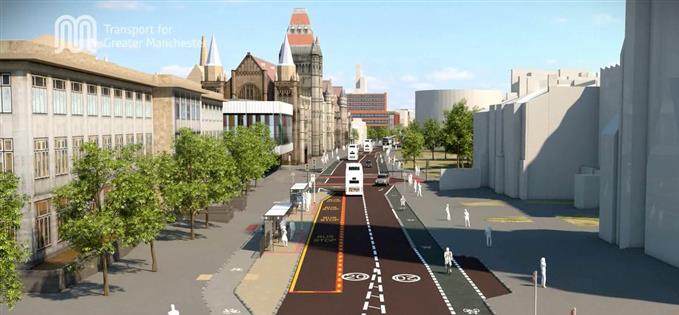 No general traffic on Oxford Road: 'future-proofing' at work
No general traffic on Oxford Road: 'future-proofing' at work"Aren't you engineering a situation where you are locking in permanent congestion and guaranteeing for Manchester hideous jams not only before every football game and big events but for people just wanting to go home?" I say to Councillor Chappell. "And won't it all collapse again if a single incident such as the Mancunian Way sinkhole occurs?"
"No, I don’t think so," she replies. "We will see things getting better. On public transport the delays have hit passenger numbers. In view of that we took the decision to delay the last part of the Portland Street works because we recognise the delays have been completely unacceptable for the buses in particular and for general motorists. But as I've said, as the Heras fences are cleared, as the works reach completion in 2017, you will see a city centre that is working very well.
"We have to expand the capacity of the public transport network by rail, bus and Metrolink. We want to make these options so attractive that any increase in traffic movements is accounted for by these. We are not anti-motorist. Proof of the pudding is that we have not increased our parking charges. What we need to have is a good range of infrastructure across the conurbation which includes good parking for cars and bikes at stations or Metrolink stations close to where people live. We are thinking about this in the long-term with TfGM currently seeking views on how we develop transport through to 2040."
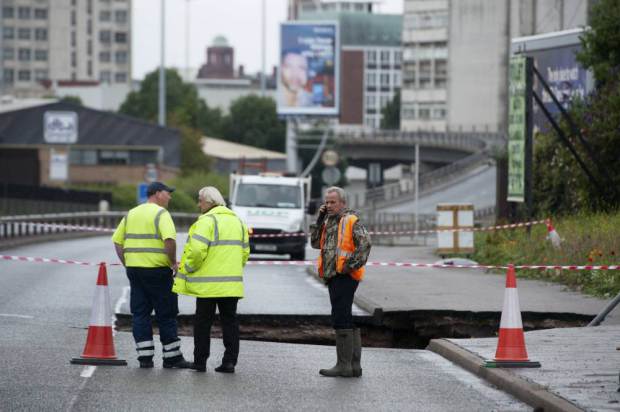 Wholesale traffic problems - the Mancunian Way sinkhole
Wholesale traffic problems - the Mancunian Way sinkholeThere we have it.
It's all going to be all right.
In HOME arts centre later that evening I bump into, occasional, Confidential writer Phil Griffin and he reminds me of how a couple of years ago Liverpool suspended their bus lanes on main routes into the city. I kick myself for not remembering this but I get a statement from a Liverpool spokesperson the following day.
"We've had half a dozen or so complaints about the suspended bus lanes but what we do know is that traffic is moving much better now general traffic isn't being funnelled into one lane on key routes."
Of course it would move better. So why doesn't Manchester follow suit? Surely the job of any transport infrastructure policy is to get people around as efficiently as possible.
TfGM told Confidential: “There are currently no plans to extend the temporary suspension of road works across the city to include bus lanes. Buses are able to carry a significantly higher number of passengers and therefore maximise the efficient use of road space to and from the city centre. A bus occupies the same amount of highway as 2 or 3 cars but is able to carry up to seventy passengers.
In a congested urban environment, it is important that we continue to promote the most efficient methods of moving people. Bus travel reduces congestion for other road users by reducing the number of car trips. Given that 31% of the Greater Manchester population does not have access to a car, reliable and punctual bus services can open up wider access to jobs, provide people access to education and reduce isolation.”
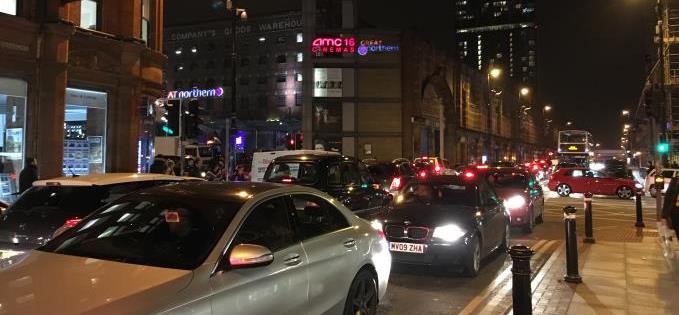 Nowhere fast - the Deansgate illogical pavement extensions in action
Nowhere fast - the Deansgate illogical pavement extensions in actionYou get the feeling there are doctrinaire reasons to do with perceived sustainability issues and graphs on traffic modelling programmes, behind Greater Manchester's transport policy rather than hard-headed practicality. Anybody who has experienced Chapel Street in Salford on a congested evening with sporadic buses on an otherwise empty bus lane will not understand the previous TfGM statement in the slightest. They will want the Liverpool policy adopted.
Councillor Chappell denies there is any such doctrinaire policy and that it's all about 'future proofing' for growth - that bloody phrase again. But surely economic growth will mean more cars on the road not less?
Look at any map of Manchester city centre and four main routes stick out all moving north east to south west. These are Deansgate (presently blocked in front of the Cathedral), Cross Street (by 2017 no longer accessible in its length to anything but trams), Mosley Street (already closed to general traffic) and Portland Street (soon to be closed to general traffic). How can that do anything but create congestion.
In all this I get the feeling the city council and TfGM find it hard to admit they got it wrong over aspects of transport policy, mistakes leading to misery for thousands and thousands of commuters on cars, in buses and in taxis while making the streets far less safe for cyclists. In the end, they seem to be saying, we know best and in the end it will all sort itself out because we say it will. Their attitude smacks of the social engineering post-WWII which was certainly not 'future-proofed'.
"Have you any idea of what is trying to be achieved," I ask Jas, the taxi driver.
"No idea, something to do with closing the city centre to cars," he replies.
The Council and TfGM swear blind this is not the case, but many people in the city region are applying the duck test. If it looks like a duck, swims like a duck, and quacks like a duck, then it probably is a duck.
Personally I don't think the Council and TfGM are trying to exclude cars, personally I sincerely hope they've got their 2017 predictions right. It's just hard to see how it can all possibly work out especially given a track record of city centre road changes which seem to have progressively made things worse for everybody including cyclists and buses. Many of the improvements in the city centre, aside from transport, have been through sound policy and sound ideas it's a shame so many people can't see a way out of the recent road bedlam.
So I've decided I'm going to be very scientific about the city centre infrastructure changes. I'm going to cross my fingers, close my eyes and hope for the best.
Jonathan Schofield wrote most of this while stuck in a taxi on Great Bridgewater Street.
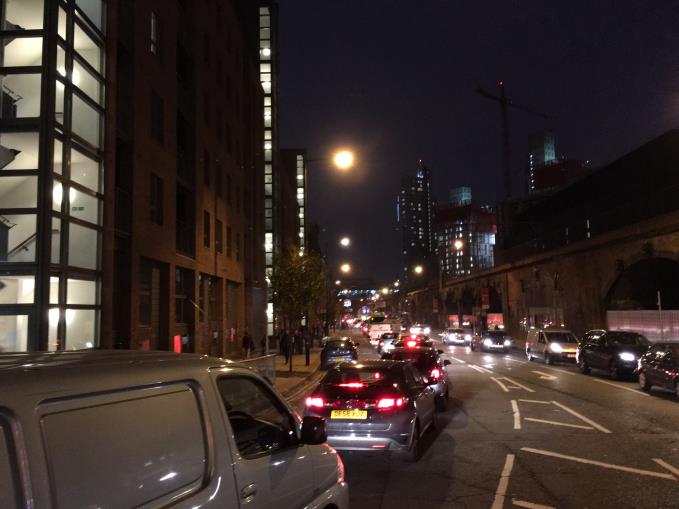 Is there a way out of this?
Is there a way out of this?












